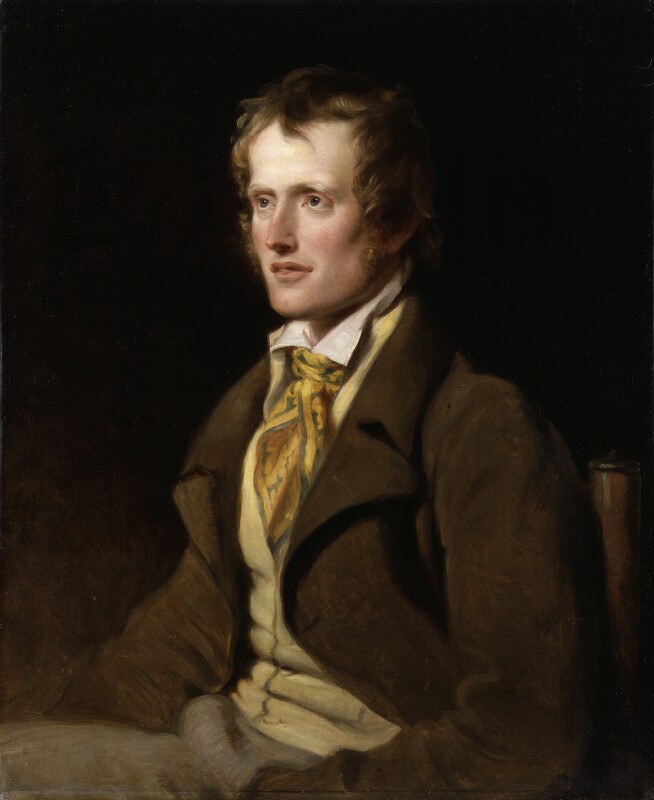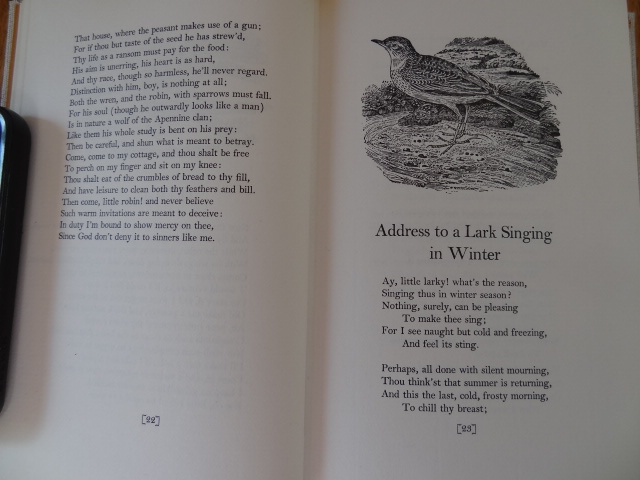
Address To a Lark Singing in Winter
1
Wing-winnowing lark with speckled breast
Has just shot up from nightly rest
To sing two minutes up the west
Then drop again
Heres some small straws about her nest
All hid from men
2
Thou farmers minstrel ever cheery
Though winters all about so dreary
I dare say thou sat warm and erie
Between the furrows
And now thy song that flows unweary
Scorns earthly sorrows
3
The little mouse comes out and nibbles
The small weed in the ground of stubbles
Where thou lark sat and slept from troubles
Amid the storm
The stubbles ic'el began to dribble
In sunshine warm
4
Sweet minstrel of the farm and plough
When ploughmans fingers gin to glow
How beautiful and sweet art thou
Above his head
The stubble field is in a glow
All else seems dead
5
All dead without the stubble ground
Without a sight without a sound
But music sunshines all around
Beneath thy song
Winter seems softened at thy sound
Nor nips to wrong
6
On all the stubble-blades of grass
The melted drops turn beads of glass
Rime feathers upon all we pass
Everywhere hings
And brown and green all hues that was
Feathered like wings
7
It is a morn of ragged rime
The coldest blast of winter time
Is warmth to this Siberian clime
Dead winter sere
And yet that clod brown bird sublime
Sings loud and clear
8
The red round sun looks like a cheat
He only shines blood freezing heat
And yet this merry birds night seat
Seems warm's a sty
The stubble woods around it meet
And keep it dry
9
Each stubble stalk a jiant tree
Scarce higher than «an infant's» knee
Seem woods to stop the winds so blea
From this snug home
Boundless this stubble wood must be
10
How safe must be this birds sweet bed
In stubble fields with storms o'er head
Or skies like bluest curtains spread
Lying so lone
With bit of thurrow o'er her head
Mayhap a stone
11
The god of nature guides her well
To choose best dwellings for her sell
And in the spring her nest will tell
Her choice at least
For God loves little larks as well
As man or beast
12
Thou little bird thou bonny charm
Of every field and every farm
In every season cold and warm
Thou sing'st thy song
I wish thy russet self no harm
Nor any wrong
13
Free from the snares thy nature shuns
And nets and baits and pointed guns
Dangers thy timid nature shuns
May thou go free
Sweet bird as summer onward runs
I'll list' to thee
14
I'd writ one verse, and half another
When thou dropt down and joined a brother
And o'er the stubble swopt together
To play 'till dark
Then in thy night nest shun cold weather
As snug's a Lark
15
Old russet fern I wish thee well
Till next years spring comes by itsel
Then build thy nest and hide it well
'Tween rig or thurrow
No doubt may be this is the dell
— Spring comes the morrow
16
Then blossomed beans will bloom above thee
And bumble bee buz in and love thee
And nothing from thy nest shall moove thee
When may shines warm
And thy first minstrel[sy] above thee
Sing o'er the farm

Address to a Lark, Singing in Winter
AY, little Larky! what’s the reason,
Singing thus in winter season?
Nothing, surely, can be pleasing
To make thee sing;
For I see nought but cold and freezing,
And feel its sting.
Perhaps, all done with silent mourning,
Thou think’st that summer is returning,
And this the last, cold, frosty morning,
To chill thy breast;
If so, I pity thy discerning;
And so I’ve guess’d.
Poor, little Songster! vainly cheated;
Stay, leave thy singing uncompleted;
Drop where thou wast beforehand seated,
In thy warm nest;
Nor let vain wishes be repeated,
But sit at rest.
‘Tis winter; let the cold content thee:
Wish after nothing till its sent thee,
For disappointments will torment thee,
Which will be thine:
I know it well, for I’ve had plenty
Misfortunes mine.
Advice, sweet Warbler! don’t despise it:
None know what’s what, but he that tries it;
And then he well knows how to prize it,
And so do I:
Thy case, with mine I sympathise it,
With many a sigh.
Vain Hope! of thee I’ve had my portion;
— Mere flimsy cobweb! changing ocean!
That flits the scene at every motion,
And still eggs on,
With sweeter view, and stronger notion
To dwell upon:
Yes, I’ve dwelt long on idle fancies,
Strange and uncommon as romances,
On future luck my noddle dances,
What I would be;
But, ah! when future time advances,
All’s blank to me.
Now twenty years I’ve pack’d behind me,
Since hope’s deluding tongue inclin’d me —
To fuss myself.
But, Warbler, mind me,
It’s all a sham;
And twenty more’s as like to find me
Just as I am.
I’m poor enough, there’s plenty knows it;
Obscure; how dull, my scribbling shows it:
Then sure ‘twas madness to suppose it,
What I was at,
To gain preferment! there I’ll close it:
So mum for that.
Let mine, sweet Bird, then be a warning:
Advice in season don’t be scorning,
But wait till Spring’s first days are dawning
To glad and cheer thee;
And then, sweet Minstrel of the morning,
I’d wish to hear thee.
John Clare
Details of 2020's Keats-Shelley Prize click here.
Details of 2020's Young Romantics Prize click here.